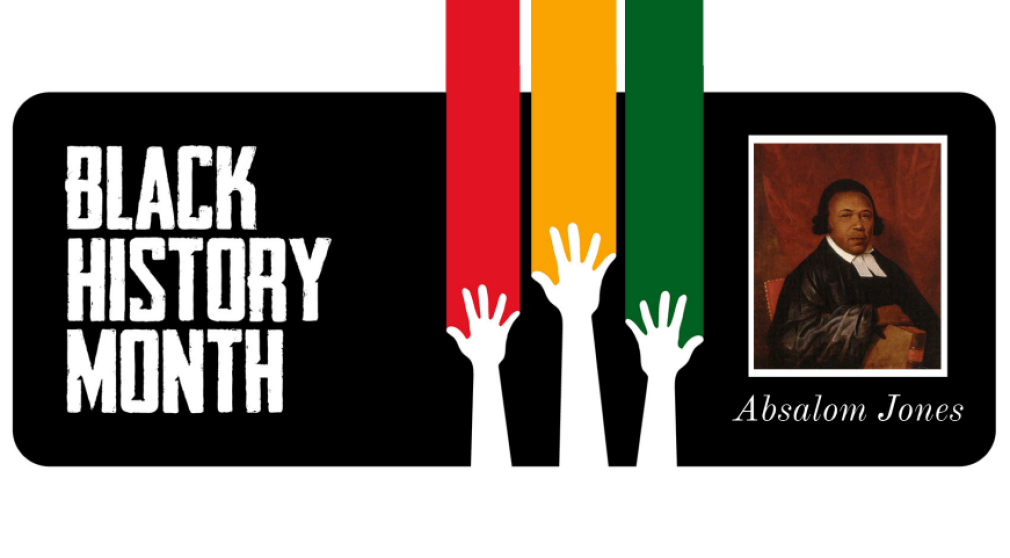Black History Month: Absalom Jones

by the rev. shug goodlow, deacon
Absalom Jones (11/7/1746 – 2/13/1818) was an African-American abolitionist and clergyman who became prominent in Philadelphia, Pennsylvania. Disappointed at the racial discrimination he experienced in a local Methodist church, he founded the Free African Society with Richard Allen in 1787, a mutual aid society for African Americans in the city. The Free African Society included many people newly freed from slavery after the American Revolutionary War. In 1794 Jones founded the first black Episcopal congregation, and in 1802 he was the first African American to be ordained as a priest in the Episcopal Church of the United States. He is listed on the Episcopal calendar of saints and is remembered liturgically on the date of his death, February 13, in the 1979 Book of Common Prayer as "Absalom Jones, Priest, 1818”.
Absalom Jones was born into slavery in Sussex County, Delaware, in 1746. When he was 16, his owner sold him along with his mother and siblings to a neighboring farmer. That year the farmer kept Absalom, but sold his mother and siblings, and moved to Philadelphia, Pennsylvania, where he became a merchant. Absalom was allowed to attend a school and learned to read and write. While still enslaved by Mr. Wynkoop (a vestryman of Christ Church and later St. Peter's), Absalom married Mary King, an enslaved woman owned by a neighbor to the Wynkoops.
According to colonial law, children took the status of their mother, so children born to slave women were born enslaved. By 1778 Absalom had purchased his wife's freedom so that their children would be free. Absalom also wrote to his master seeking his own freedom, but was initially denied. In 1784, however, Wynkoop set him free from slavery. Absalom took the surname "Jones" as an indication of his American identity.
Around 1780, a Methodist movement was sweeping through the colonies as part of the Second Great Awakening. It came at a time of revolutionary ferment in the closing period of the American Revolutionary War. The movement was especially popular in New York, Baltimore, and Philadelphia. Methodists had developed in Great Britain as evangelicals within the Church of England. In December 1784, Thomas Coke and Francis Asbury established the Methodist Episcopal Church as a new denomination, separate from the Church of England. Pennsylvania abolished slavery and became a free state in the new United States. Jones became a lay minister of the interracial congregation of St. George's Methodist Episcopal Church in Philadelphia. The Methodist church admitted persons of all races and allowed African Americans to preach. Together with Richard Allen, Jones was one of the first African Americans licensed to preach by the Methodist Episcopal Church.
But some members of the church still practiced racial discrimination. In 1792, while at St. George's Methodist Episcopal Church, Absalom Jones and other black members were told that they could not join the rest of the congregation in seating and kneeling on the first floor and instead had to be segregated in the gallery or balcony. After completing their prayer, Jones and most of the church's black members got up and walked out.
Jones and Allen founded the Free African Society (FAS), first conceived as a non-denominational mutual aid society, to help newly freed slaves in Philadelphia. Jones and Allen later separated, as their religious lives took different direction but they remained lifelong friends and collaborators.
As 1791 began, Jones started holding religious services at FAS, which the following year became the core of his African Church in Philadelphia. Jones wanted to establish a black congregation independent of white control, while remaining part of the Episcopal Church. After a successful petition, the African Episcopal Church of St. Thomas, the first black church in Philadelphia, opened its doors on July 17, 1794. Jones was ordained a deacon in 1795 and a priest in 1802, became the first African-American priest in the Episcopal Church.
Jones died on February 13, 1818, in Philadelphia. He was originally interred in the St. Thomas Churchyard in Philadelphia, Pennsylvania. His body was relocated to Lebanon Cemetery and then to Eden Cemetery. In 1991, his remains were exhumed, cremated and placed in a reliquary in the Absalom Jones altar of the current African Episcopal Church of St. Thomas. The chapel is named in his honor, as is the church's rectory. A cenotaph was placed at Eden Cemetery in Collingdale, Pennsylvania marking the site of his former grave. The Diocese of Pennsylvania honors his memory with an annual celebration. The national Episcopal Church remembers his life and service annually on the anniversary of his death, February 13.

